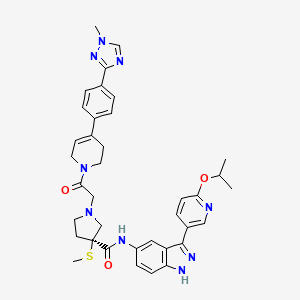m6A-centered Drug Response Information
General Information of the Drug (ID: M6APDG02546)
| Name |
MK-8353
|
||||
|---|---|---|---|---|---|
| Synonyms |
KPQQGHGDBBJGFA-QNGWXLTQSA-N; GTPL9974; SCHEMBL10236331; MK8353; (3S)-3-methylsulfanyl-1-[2-[4-[4-(1-methyl-1,2,4-triazol-3-yl)phenyl]-3,6-dihydro-2H-pyridin-1-yl]-2-oxoethyl]-N-[3-(6-propan-2-yloxypyridin-3-yl)-1H-indazol-5-yl]pyrrolidine-3-carboxamide
Click to Show/Hide
|
||||
| Status |
Phase 1
|
||||
| Structure |
 |
||||
| Formula |
C37H41N9O3S
|
||||
| InChI |
1S/C37H41N9O3S/c1-24(2)49-32-12-9-28(20-38-32)34-30-19-29(10-11-31(30)41-42-34)40-36(48)37(50-4)15-18-45(22-37)21-33(47)46-16-13-26(14-17-46)25-5-7-27(8-6-25)35-39-23-44(3)43-35/h5-13,19-20,23-24H,14-18,21-22H2,1-4H3,(H,40,48)(H,41,42)/t37-/m0/s1
|
||||
| InChIKey |
KPQQGHGDBBJGFA-QNGWXLTQSA-N
|
||||
| PubChem CID | |||||
| TTD Drug ID | |||||
Target Gene(s) and Their Upstream m6A Regulator, Together with the Effect of Target Gene(s) in Drug Response
The target genes involved in drug-target interaction (such as drug-metabolizing enzymes, drug transporters and therapeutic targets) and drug-mediated cell death signaling (including modulating DNA damage and repair capacity, escaping from drug-induced apoptosis, autophagy, cellular metabolic reprogramming, oncogenic bypass signaling, cell microenvironment, cell stemness, etc.) could be regulated by m6A regulator(s) and affected their corresponding drug response. You can browse detailed information on drug-related target gene(s) mediated by m6A regulators.
Ephrin type-B receptor 2 (EPHB2)
Fat mass and obesity-associated protein (FTO)
| In total 1 mechanisms lead to this potential drug response | ||||
| Response Summary | Ephrin type-B receptor 2 (EPHB2) is a therapeutic target for MK-8353. The Fat mass and obesity-associated protein (FTO) has potential in affecting the response of MK-8353 through regulating the expression of Ephrin type-B receptor 2 (EPHB2). | [1], [2] | ||
Heterogeneous nuclear ribonucleoproteins A2/B1 (HNRNPA2B1)
| In total 1 mechanisms lead to this potential drug response | ||||
| Response Summary | Ephrin type-B receptor 2 (EPHB2) is a therapeutic target for MK-8353. The Heterogeneous nuclear ribonucleoproteins A2/B1 (HNRNPA2B1) has potential in affecting the response of MK-8353 through regulating the expression of Ephrin type-B receptor 2 (EPHB2). | [2], [3] | ||
Methyltransferase-like 14 (METTL14)
| In total 1 mechanisms lead to this potential drug response | ||||
| Response Summary | Ephrin type-B receptor 2 (EPHB2) is a therapeutic target for MK-8353. The Methyltransferase-like 14 (METTL14) has potential in affecting the response of MK-8353 through regulating the expression of Ephrin type-B receptor 2 (EPHB2). | [2], [4] | ||
Methyltransferase-like 3 (METTL3)
| In total 1 mechanisms lead to this potential drug response | ||||
| Response Summary | Ephrin type-B receptor 2 (EPHB2) is a therapeutic target for MK-8353. The Methyltransferase-like 3 (METTL3) has potential in affecting the response of MK-8353 through regulating the expression of Ephrin type-B receptor 2 (EPHB2). | [2], [4] | ||
RNA demethylase ALKBH5 (ALKBH5)
| In total 1 mechanisms lead to this potential drug response | ||||
| Response Summary | Ephrin type-B receptor 2 (EPHB2) is a therapeutic target for MK-8353. The RNA demethylase ALKBH5 (ALKBH5) has potential in affecting the response of MK-8353 through regulating the expression of Ephrin type-B receptor 2 (EPHB2). | [2], [5] | ||
YTH domain-containing family protein 1 (YTHDF1)
| In total 1 mechanisms lead to this potential drug response | ||||
| Response Summary | Ephrin type-B receptor 2 (EPHB2) is a therapeutic target for MK-8353. The YTH domain-containing family protein 1 (YTHDF1) has potential in affecting the response of MK-8353 through regulating the expression of Ephrin type-B receptor 2 (EPHB2). | [2], [4] | ||
References